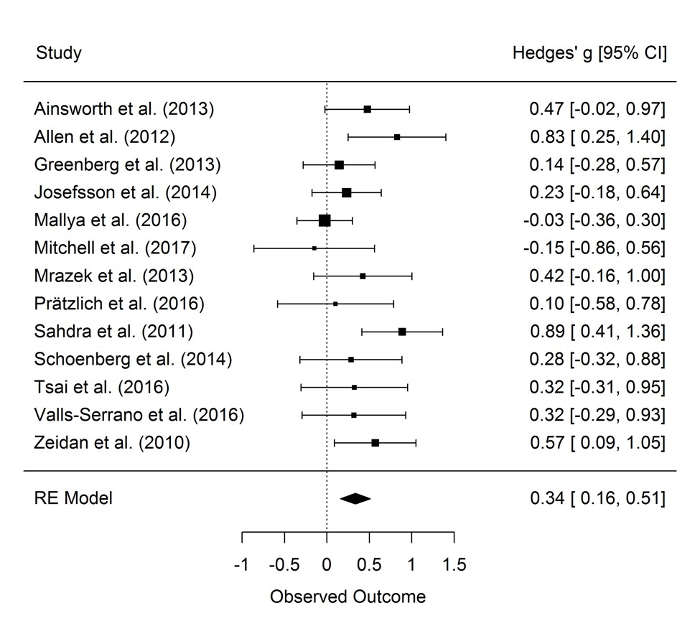Luis Cásedas (a), Vincenzo Pirruccio (a), Miguel A. Vadillo (b) y Juan Lupiáñez (a)
(a) Centro de Investigación Mente, Cerebro y Comportamiento (CIMCYC), Universidad de Granada, España
(b) Dept. de Psicología Básica, Universidad Autónoma de Madrid, España

(dp).
Does mindfulness meditation improve our capacity to manage attention and behavior in a flexible manner toward the achievement of relevant goals? Here, we describe the first meta-analysis assessing the efficacy of mindfulness mediation training as an enhancer for executive control. The study synthesizes 13 randomized controlled trials conducted in adult samples, in which cognitive performance was evaluated by means of neuropsychological tests and computerized cognitive-behavioral tasks. The results of the meta-analysis suggest that mindfulness meditation practice is linked to a moderate yet consistent improvement of executive control.
The last two decades have been an extraordinarily fruitful period for the scientific research of mindfulness―a field in which more than 2000 articles have been published only during the last year. Likewise, mindfulness meditation practices have become enormously popular outside academia: nowadays, only few people have not heard about them, either in the media or through the advice of some friend or relative. But… what is mindfulness meditation? Generally speaking, we can conceptualize it as a family of attentional and emotional regulatory mental training techniques that aim to cultivate and maintain a state of general psychological well-being (Lutz, Slagter, Dunne & Davidson, 2008).
Mindfulness meditation has only recently become popular in the West. However, its origins are rooted in the Buddhist contemplative tradition and date back more than 2.500 years. In the India of that time, meditation was considered an effective strategy to train the human mind, which the Buddhist psychology described by means of the «monkey mind» metaphor, given its unsettled and restless character. According to this analogy, our mind tends to automatically and restlessly jump from one thought or emotion to the next, and then again, and again… just like a monkey jumps from branch to branch (Vago & Zeidan, 2016).
This Buddhist view about the mind’s nature coincides with the perspective held by contemporary psychology and cognitive neuroscience. According to them, the mind’s default mode is that of «mind wandering»: a cognitive process our mind is spontaneously inclined to, especially when not focused on anything in particular or when facing uninteresting, boring tasks, and by which we drift through memories, worries, fantasies, and longings (Smallwood & Schooler, 2015).
Luckily, there exists another process that largely opposes the mind’s default mode, which allows us to avoid its wanderings and drifts: it is known as executive control (Thomson, Besner, & Smilek, 2015). Executive control is composed by a set of cognitive functions related to the voluntary regulation of attention and behavior. It is related, for instance, with the capacity to direct our attention and actions to a relevant stimulus or task in a sustained manner while ignoring internal and external distractions. Executive control is, in short, the command post of the human cognitive system, a function key to the regulation of behavior for the achievement of mid- and long-term goals (Diamond, 2013).
In light of the above, one might ask: does mindfulness meditation enhance executive control? Our research group set out to answer this question by carrying out the first systematic and meta-analytic review of the scientific literature published on this topic to date (Cásedas, Pirruccio, Vadillo, & Lupiáñez, 2020).
There are two types of mindfulness meditation practice, usually known as focused attention and open monitoring. In our meta-analysis, we selected studies conducted in adults that evaluated the efficacy of these two types of meditation practice in enhancing several cognitive functions typically associated with executive control. In these studies, cognitive performance was assessed by means of objective measures such as reaction time or accuracy in cognitive-behavioral tasks or neuropsychological tests. Of note, we only covered randomized controlled trials, the type of study considered to be the “gold standard” of scientific evidence. Thirteen studies met the established criteria and were included in the meta-analysis.
The results from the meta-analysis indicated that mindfulness training exerts a positive impact, of moderate yet significant size, and relatively consistent, on executive control (see Figure 1), which suggests that these practices are effective in enhancing it.

Figure 1.- Illustration of the main result of the study, adapted from the original (Cásedas et al., 2020). It depicts the effect size―that is, the extent to which mindfulness training has an impact on executive control―observed for each study (squares) and for all studies (diamond) included in the meta-analysis. The middle dashed line represents zero, or absence of effect. The larger the effect observed in each individual study, the further away the square is from the dashed line, with positive values indicating improvements in executive control because of mindfulness meditation. As shown, the average effect size indicated that mindfulness meditation training produces a moderate, significant improvement in executive control. Complementary analyses also showed this effect to be consistent, in the sense that results from individual studies did not differ much from one another.
On the other hand, a qualitative analysis showed a number of methodological issues extant in the literature reviewed. This has two consequences. First, it calls for caution when interpreting our results because the actual size of the effect under investigation might be smaller than the data show. Second, it is a wake-up call for future studies within this research field, which, given its youth, has still to fully develop and mature. In particular, future mindfulness research (as research in any other field) would greatly benefit from regular adoption of research practices such as pre-registration or data sharing, as well as from the constant scrutiny by the scientific community through replication studies.
Nonetheless, while we wait for those new studies, current evidence shows mindfulness meditation to be a useful strategy to enhance our executive control. Thereby, modern science aligns with Buddhist tradition and psychology: meditation can provide some discipline to the impatient and restless monkey which our mind often resembles.
References
Cásedas, L., Pirruccio, V., Vadillo, M. A., & Lupiáñez, J. (2020). Does Mindfulness Meditation Training Enhance Executive Control? A Systematic Review and Meta-Analysis of Randomized Controlled Trials in Adults. Mindfulness, 11, 411–424.
Diamond, A. (2013). Executive Functions. Annual Review of Psychology, 64, 135–168.
Lutz, A., Slagter, H. A., Dunne, J. D., & Davidson, R. J. (2008). Attention Regulation and Monitoring in Meditation. Trends in Cognitive Sciences, 12, 163–169.
Smallwood, J., & Schooler, J. W. (2015). The Science of Mind Wandering: Empirically Navigating the Stream of Consciousness. Annual Review of Psychology, 66, 487–518.
Thomson, D. R., Besner, D., & Smilek, D. (2015). A Resource-Control Account of Sustained Attention: Evidence From Mind-Wandering and Vigilance Paradigms. Perspectives on Psychological Science, 10, 82–96.
Vago, D. R., & Zeidan, F. (2016). The Brain on Silent: Mind Wandering, Mindful Awareness, and States of Mental Tranquility. Annals of the New York Academy of Sciences, 1373, 96–113.
Manuscript received on April 9th, 2020.
Accepted on July 25th, 2020.
This is the English version of
Cásedas, L., Pirruccio, V., Vadillo, M. A., y Lupiáñez, J. (2020). Meditación mindfulness y control ejecutivo: ¿Disciplina para nuestra inquieta ‘mente de mono’? Ciencia Cognitiva, 14:2, 53-56.

